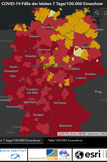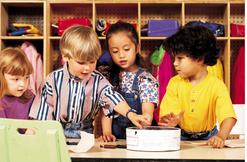To open daycare centers and schools or not?
What has been decided and what are the current arguments for or against an opening?
Last Wednesday (10 February), the Chancellor and the Minister Presidents decided that the Länder may decide whether and to what extent they open day-care centres and schools. Even if it is conveyed differently in the press: The round did not decide that daycare centers and schools will open or when and how that will be the case. However, it has left it up to the Länder to decide this.

What exactly was decided?
The draft resolution, the text of which we are printing at the end, merely states that the day-care centres and schools are to be reopened first. When or how this will be the case was not decided yesterday, as the Länder have decision-making authority on this point. If, for example, it was decided in previous meetings that day-care centres and schools would be closed, then this was only possible because the Minister Presidents wanted to act together here and bowed to public pressure - or that of the Federal Government.
Will daycare centers or schools be open or not?
Whether and when daycare centers and schools will reopen is decided individually by the state governments of the 16 federal states. The first states have already announced that they will reopen daycare centres and schools on 15 February (so far: Saxony and Lower Saxony) or on 22 February (e.g. Baden-Württemberg, Berlin and Brandenburg). Other states are expected to open later. However, this does not mean that all pupils will go back to school every day.
We inform you on Corona-was-darf-ich about the current regulations and/or prospective dates and regulations for the openings of Kitas and schools. (Corona-what-do-you-call-it).
How will daycare centers and schools be opened?
So far, there are no details, but it seems likely that there will be a limited regular operation in the day-care centers and that grades 1 to 6 will be the starting point in the schools.
Restricted regular operation means that the Kitas are increasingly opened to certain groups of parents or a certain number of children are specified. Based on past experience, it can probably be assumed that many parents will continue not to bring their children to the Kita.
In the schools there could be alternating teaching with reduced (half?) classes, whereby hygiene and other regulations must be observed.
What speaks for and against the opening of day-care centres and schools?
There are reasons in favour of a partial opening as well as reasons against it. And the parents are also very divided here. We first summarize the reasons that speak for an opening - below we then name the reasons that speak against an opening. It is not our intention to say what we think is better, but simply to name the respective points.
Why is the opening of day-care centres and schools being discussed at all?
There are many different reasons for opening up: On the one hand, many children are under a lot of psychological pressure. A recently published Study (here you can find a short report on the Study) shows that one third of children and young people feel very stressed. This can have very different reasons: since families, i.e. parents and children, squat on each other a lot and often go outside very little, arguments are more frequent. They may also simply miss their friends, whom they often see at daycare or school. It is quite unusual when you are only allowed to see one friend for such a long time and often have to keep yourself busy on your own, for example because your parents have to work at the same time.
Many children now also have to learn at home every day, be it that the lessons take place in class via the computer and/or they are sent learning materials by email or post or have to pick them up at school. Many daycare centers also send home learning prompts to their children. However, learning at home often doesn't work so well, for example because several children are learning at the same time or some are playing while their brother or sister has to study. Other children have no room of their own, maybe none at all or only one computer, which all children - and maybe the parents as well - have to share. Parents who do not speak German or have only a low level of education themselves cannot help the children to learn, so the children do not learn as much as they normally do at school. Some even unlearn the material again because they learn too little. Or they unlearn the German language because they don't speak German at home. And even parents who have studied can't always help their children. I can help our son with maths and English, but not with biology or many other subjects.
On the other hand, many parents are now at the end of their tether because they often have to work and look after the children at the same time. Many parents have to - or want to - take care of their duties as employees or self-employed people again. The world does not stand still and the bosses or clients may also have tasks that urgently need to be taken care of. The company where the parents work has to make ends meet somehow. Other parents are afraid, perhaps because they are on short-time work or have become unemployed, because they don't know whether the company will survive the long closure period economically, and so on.
There are also concerns that violence within families is on the increase, and this particularly affects families with less favourable circumstances elsewhere (see, for example, this Article).
Why shouldn't children go back to daycare and schools yet?
On the one hand, the risk that children and adolescents or educators or teachers could become infected with the COVID 19 virus and (seriously) ill speaks against the rapid opening of daycare centres and schools. On the other hand, it cannot be ruled out that the increased encounter of children and adolescents will accelerate the incidence of infection again somewhat and that the downward trend of the last few weeks may be halted and possibly lead to rising incidence values again. This applies in particular with regard to the higher risk of infection of the mutants from Great Britain and South Africa.
Furthermore, the journeys to and from school are risky, especially if these take place in (overcrowded) buses and trains. And of course the risk remains that children and adolescents stand together in groups outside the classroom or schoolyard and talk to each other without masks and sufficient.
Who is in favour of opening up daycare centres and schools and why?
In addition to the reasons that may speak in favour of opening from the parents' or children's point of view, there are also business associations, economists and journalists who are very much in favour of schools reopening. On the one hand, self-interest plays a role, for example, when employers demand that daycare centres and schools reopen so that parents can return to normal work. Other organisations, as well as economists, point out that children learn less at home, especially those children whose parents can't help them, who may not have a computer, and so on.
Who is against the opening of day-care centres and schools and why?
Many parents' associations and parents, but also trade unions and teachers' associations tend to be against the opening of schools - for very different reasons. Parents see the health of their children in danger, the trade unions and teachers' associations focus on the health risk for educators and teachers.
With regard to educators, various studies by health insurance funds have found that they are the occupational group with the highest rate of sickness notifications. Even if deficiencies in the data basis can be cited here, this is at least an indication of a high risk. This is all the more true as the handling of small children cannot usually be done with the mask in front of the face and there is also frequent physical proximity between the educator and the child.
If one follows the press reports, then also the Federal Chancellor was against a premature opening of day-care centres and schools, even if she is in principle of the opinion that day-care centres and schools should be the first institutions to reopen.
The resolution on day-care centres and schools in the wording:
"Children and young people, like their parents, are particularly affected by the restrictions. In order to guarantee education and the future of our children and young people, Openings in the care and education sector are therefore a priority. This area should therefore be the first to reopen in stages. Masks, ventilation and hygiene measures will still be necessary in this process. Medical masks should be used wherever possible. Increasingly, rapid tests should also enable safe teaching and care and education in day-care facilities for children and in day-care for children and minimise the risk of infection. In view of the high social importance of education and care for children, adolescents and their parents, and in view of the difficulty of implementing clearance rules in the day-to-day work of day-care centres and primary schools, the Federal Government and the Länder request the Federal Minister of Health, in consultation with the GMK, to examine whether, in the next update of the Coronavirus Vaccination Ordinance, employees in day-care centres and primary school teachers can be vaccinated at an earlier stage than currently envisaged - in category 2 with high priority. Within the framework of their cultural sovereignty, the Länder will decide on the gradual return to face-to-face teaching and the expansion of the provision of child day care. They will at the same time increase their efforts to promote the digitisation of learning to accompany part-time teaching and the gradual ramp-up. The federal government is supporting this through the Digitalpakt Schule (digital pact for schools), including immediate programmes for end devices for pupils and teachers."
An earlier article summarizes the arguments for and against opening up from a different perspective (see here).
Published on
Topics
Articles on the topic
-
How do I find a school place for my child?
Depending on the state and type of school, different things need to be...

-
Childcare - how does it work in Germany?
The path from application to daycare place is simple and complicated at...

-
Controversy: open schools or close schools?
Politicians should react now to slide unprepared into a forced closure....

-
Corona pandemic severely disadvantages children and young people - but there is no "Corona generation"
This is a core finding of the anthology "Generation Corona? How young...

-
What to do after the Easter holidays? - Part 2: Final exams
An overview of the regulatory diversity

-
Kitas and schools in a state of flux
Update from 9.4.2021 on the current regulations
